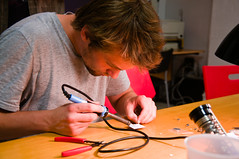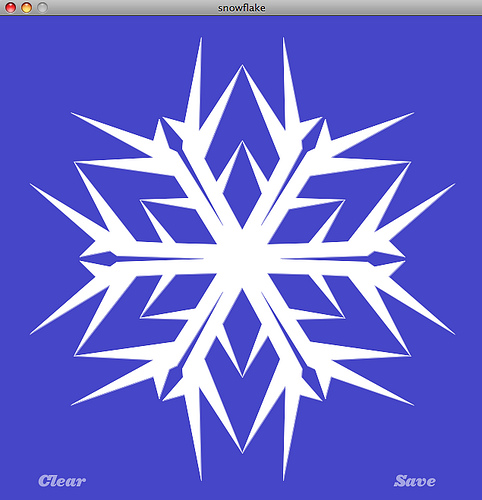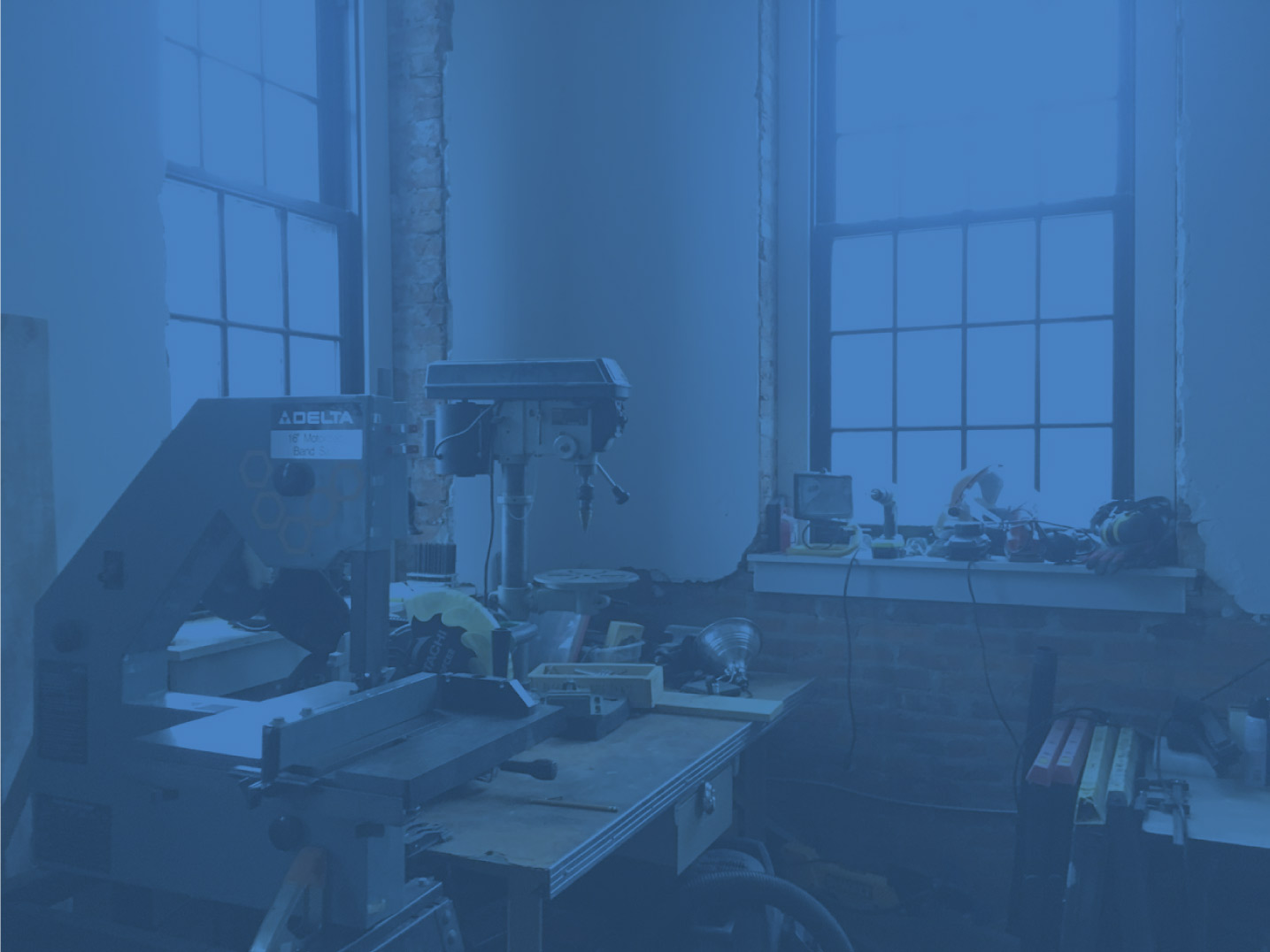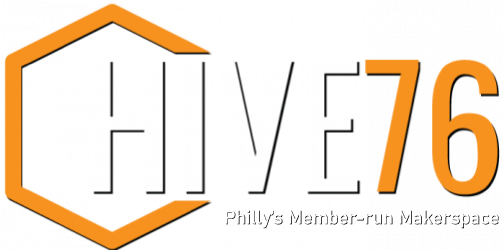I met Zach Hoeken Smith at one of my first Hive76 events. I donated to the pledge drive to buy a MakerBot Cupcake CNC and extruder. Once the drive was successful and 3DPO built, Hive76 held a workshop to learn how to design and print with SketchUp and the MakerBot. Our instructor was MakerBot co-founder Zach himself. Afterwards, everyone went out to West Philly for some Ethiopian food. It was a nice time. I haven’t seen him since, so I was surprised to hear from fellow member Jordan Miller that Zach had left Makerbot and was living in China. I reached out to Zach for a chat and here’s what I learned about my favorite hardware innovator. Continue reading “Exclusive: Zach Hoeken on leaving MakerBot and his future.”
Oolong, and Thanks For All The Mitch!

This Friday, we were able to inaugurate our newly completed class space with a most auspicious visitor — Mitch Altman!
PJ, Brendan, Robert et al were working until the wee hours the night before making sure that the space was ready to rock — and it was — literally.
Mitch arrived a bit before the appointed time, snapped a few photos, schmoozed, chowed down some local Chinese food etc. and, while documenting our stash of Elephant Heads,

anointed Hive76 as the most organized hacker space he’s seen. Quartermaster Brendan took appropriate pride in the observation.
Mitch basically talked about the Maker/Hacker movement in general, showed some of the kits that were keeping him company on the train, and weaved it all in a thematic web reminiscent of Arlo Guthrie’s is-this-guy-rambling-no-holy-shit-he’s-a-genius-because-it-all-makes-sense-in-the-end style.
After that, everyone bought a kit or two and lost themselves in the task of soldering. I don’t know whether it’s the solder fumes or just the act of soldering itself, but I felt pretty good at the end of it all.
The new space is completely awesome and turned out to be nearly perfect for the event. Hats off to Brendan, Robert, PJ and Jordan!
How to: Innovate in Science with Open Source Technology
One of our core members, Jordan Miller, has just published a scientific paper using RepRap 3D printing technology to engineer living tissues for regenerative medicine. I’ll give you a rundown of the science and a step-by-step guide of how Jordan got to this great spot in his career. Jordan is quick to point out that this is work that would not have been possible 5 years ago, or without the help of RepRap, Hive76, and this wonderful city of Philadelphia.
There are other labs around the world that are attempting what Jordan and the rest of the team at UPenn and MIT have been working towards. The end goal of regenerative medicine research is engineered tissues and replacement organs for treatment of human disease. As Science news says,
Imagine a world where if your heart or kidneys failed, you wouldn’t have to endure an agonizing, possibly futile wait for a donor whose organ your body might reject. Instead, a doctor would simply take cells from your own body and use them to “grow” you a new organ.
Other lines of research are attempting to 3D print directly with living cells and gel. These so-called “bioprinting” approaches involve loading cells and gel in syringes to be used as feedstock to create a structure from scratch. The problem is that healthy liver cells, for example, usually die of starvation (lack of nutrients) and suffocation (lack of oxygen) while enduring the slow 3D printing process.

Enter Jordan and his innovation: since vasculature provides the lifeblood to resident cells, why not focus on the vasculature first?
Jordan and the rest of the research team at UPenn and MIT have developed a new way to create vasculature for living tissues. This 4 step process involves: 1) 3D printing a network of sugar filaments, 2) surrounding it with living cells in a gel, 3) dissolving away the sugar to leave behind a vascular network for 4) the delivery of nutrients and oxygen. He accomplished this with a custom built 3D printer, extruder and control software.
Here’s a step-by-step of Jordan’s many year process:
- Get a crazy idea to link sugar and vasculature when comparing the interior of a 3D print to a capillary network.
- Get a PhD in bioengineering
- Move to Philadelphia
- Join a hackerspace
- Get introduced to 3D printing, MakerBot and RepRap
- Assemble your first MakerBot
- Invent a heated build platform to dry your sugar while printing.
- Add a heater to the Frostruder so you can print molten sugar.
- Assemble a customized RepRap Mendel that fits your new extruder.
- Get help from your hackerspace to properly control your pneumatic extrusion.
- Work for months perfecting recipes and methods for printing vasculature.
- Write it all up in a research paper and submit!
You can read the Penn press release about this awesome science, an overview from Science News, or the full paper. A more detailed post about the hardware used in this project will follow and soon you’ll be able to make your own sugar extruder. (It prints chocolate too!)
Meet Mitch Altman!!!!

Next Friday (July 6), Mitch Altman’s nationwide AMTRAK tour of hackerspaces rolls into Philadelphia, and Hive76 will be welcoming him in style. Stop by our space on Friday night for an free lecture and electronics hacking workshop officiated by Mitch himself. There will be food, drink, merriment, and of course the opportunity to swap ideas and stories with a living legend in the DIY community.
If you haven’t followed Mitch Altman’s career, you probably still know of some of his very cool projects, like his TV-B-Gone remote, or his Brain Machine glasses, and his many cool articles for Make: Magazine. Despite the great commercial success of his inventions, Mitch helped pioneer the Open-Source Hardware movement by publicly refusing to patent his ideas, and continues to inspire the maker community by advocating the free exchange of DIY electronics knowledge.
Come by on Friday, July 6, as Mitch demos his latest inventions and kits, and leads a fun hacking workshop suitable for everyone from total novices to advanced solder-smiths! Its guaranteed to be a great time!
Date: July 6, 2012
Time: 6:00
Location: Hive76 (915 Spring Garden St.)
Price: ADMISSION IS FREE! (kits for the workshop start around $10)
Pentesting Wargame On Sunday
Sunday, May 20th at 6 PM we’re hosting a pentesting wargame. Players will learn how to use common security tools such as Medusa, and John the Ripper, and identify server misconfigurations and administrative carelessness.
Come and join in on the fun! Bring a laptop!
Announcing New Security Group
We’re starting a new group at Hive 76 called “Scheduled Sunday Security Sessions” (an homage to PJ Santoro’s Monthly Monday Microcontroller Madness). S4 will focus on computer and electronic security. We’ll have demos and presentations on security related topics, as well as group penetration testing challenges each month.
The first meeting will be on June 10th, at 6 PM.
See you there!
Philly Tech Week – We’re Booked Solid
Monday – MMMM Microcontroller Madness
Tuesday – DIY Music Night
Wednesday – Open House
Thursday – Game Night Featuring Tetris Arm Wrestling Tournament
Friday – PTW Gala demonstration (offsite)
Events at Hive76 Monday through Thursday start at 7pm and
ARE OPEN TO THE PUBLIC.
Friday Gala Ticketing information available here.
Tonight@Hive76: Hacking Your Lawyer: A Primer
Our speaker series continues tonight at 7:30PM!
We are proud to welcome Lea Rosen, Rutgers-Camden law student, researcher, and writer, to Hive76 to present a talk entitled, “Hacking Your Lawyer: A Primer.”
“Ever feel like your questions elicit boring and disappointing answers from lawyers? It happens all the time, and it feels counterintuitive – the stuff you are working on is complex and exciting, and you know the law is complex and kind of interesting. Your gut’s not wrong – your questions are. I’ll explain why we talk the way we do, and how you can learn a couple simple lessons to help frame your questions in a way that will draw out the information you really want. “
In addition to her main presentation, she will also be discussing some of the topics that were brought up on our mailing list, like the legal implications of hacking the things that you own. There happens to be a DMCA Rulemaking Session this year, so she will discuss how the DMCA works and what it takes to get legal protection for hardware hacking. There will be a Q&A section afterwards because I’m sure we’ll have some questions. 🙂
A little more about Lea:
Her big motivation is to break down the cultural boundaries between technologists, hackers, lawyers, human rights advocates, activists, and theorists. She provides research assistance for Evgeny Morozov, author of The Net Delusion, and Greg Lastowka, Professor at Rutgers School of Law, Camden and author of Virtual Justice[pdf]. She has interned at the Electronic Frontier Foundation and in the Federal District Court in Newark, NJ. She volunteers with the Philadelphia ACLU and the National Lawyers Guild AnoNLG project, and she co-founded of the Rutgers Cyberlaw Society. She has written on the interpretation of software licenses by the 9th Circuit, encryption and border searches, and the privacy and liberty implications of domestic UAV deployment. She also had the opportunity to write an FAQ for the Yes Men! She has her BA in Humanities and will be getting her JD this May from Rutgers-Camden.
See you tonight!
UPDATE: Lea has informed me that Greg Lastowka’s book, Virtual Justice is available for free here[pdf]. It was released under a Creative Commons license! Nice! Hard copy available from Yale University press here.
Open call for help from ESR

Eric S. Raymond has recently asked for some help from Philadelphia’s DIY and engineering community with an exciting project. Amongst many other interesting projects, ESR is the lead developer on GPSd, a “service daemon that monitors one or more GPSes…”. He needs help building a cheap GPS repeater to forward the RF data from his roof antenna to his test rack in his office. For any student or hobbiest electrical engineers looking to make a name for themselves, this could be an excellent opportunity.
Maker Collider Event with NextFab Studio: TUESDAY

Join us on TUESDAY, December 20th, 7 pm – Midnight
Meet-and-Make, Hive76 and NextFab Studio Members
@ http://NextFabStudio.com/ @ 3711 Market Street
This “Maker Collider” event will be a great opportunity to make awesome stuff.
We had proposed these projects:
All details are here on the Wiki
After reviewing the projects here and those proposed by NextFab members it sounds like we will be doing some form of the Chess boards, the snowflakes, some robotics, and a bunch of laser-engraving. But what if you don’t like those? Come by anyway and you can rally troops for helping you on your own project(s).
NextFab Studio will have these staff members on hand throughout the event:
Chrinstine : Textile and Industrial Design ( fabric knowledge, product design,cad, sewing )
Ian : Electronics (pcb design/fabrication, coding, wiring, soldering, etc.)
Seth : Mechanical Engineer (handtools, cad, product design)
Brandon : Multi-Media Designer ( 3d printing, graphic design, product design, cinematography, cad)
Anything you want to do, you can do. AWESOME.
Check out all their equipment.
Oh, and there will be food too. Be there at 7 pm!!


